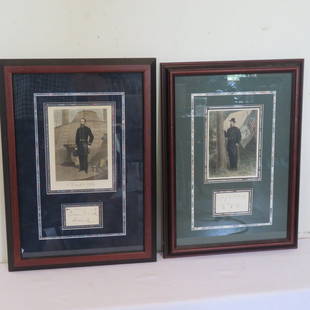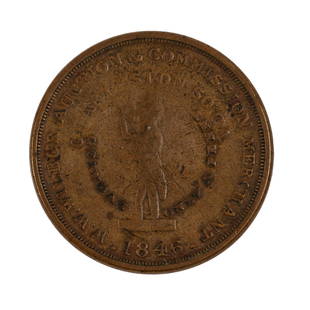
Winfield Scott, Youngest General in the U.S. Army, Issues Order in War of 1812
Similar Sale History
View More Items in Militaria & War MemorabiliaRelated Militaria & War Memorabilia
More Items in Militaria & War Memorabilia
View MoreRecommended Collectibles
View More


Item Details
Description
Winfield Scott, Youngest General in the U.S. Army, Issues Order in War of 1812
From his headquarters in Buffalo, New York, Brigadier General Winfield Scott orders his wagon-master-general to send an express wagon to Cambria, a town in Niagara County, New York, twenty miles north of Buffalo.
[WAR OF 1812.] Winfield Scott, Manuscript Document Signed, to Captain Camp, May 11, 1814, Buffalo, New York. 1 p., 8" x 5". Tear on fold, slightly affecting signature; general toning; very good.
Complete Transcript
Head Quarters
Buffalo May 11th 1814
Sir,
You will furnish an express to Cambria without delay
W. Scott / B. Genl Comg.
Cap Camp
A.D WM Genl
Historical Background
After successfully drilling his 2nd Regiment of Artillery in the summer of 1812 in Philadelphia, Scott joined a brigade in northwestern New York making preparations for an invasion of Canada. In the Battle of Queenston Heights on October 13, 1812, Scott led the expeditionary force across the Niagara River after his commanding officer was wounded. Because of disagreements among his superiors, he was not properly reinforced and had to surrender to save his troops from a massacre. He was exchanged as a prisoner later that year and promoted in March 1813 for his actions in the battle.
In May 1813, Scott led the first brigade in the Battle of Fort George on the Niagara Peninsula. Although he routed the British and could have captured them, two orders from his superior forced him to halt the attack. He then participated in the planned attack on Montreal, which because of poor planning on the part of General James Wilkinson turned from a sure victory into a humiliating failure for the American army. When Scott returned to Washington, D.C., to report, Secretary of War John Armstrong promoted him to brigadier general on March 19, 1814. He was placed in command of the 1st Brigade of General Jacob Brown's Left Division in Buffalo, New York.
Scott immediately set up a camp of instruction and drilled and disciplined his brigade using a modern translation of a French drill manual. Through Scott's efforts, the American soldiers who met the British at the Battle of Chippawa on July 5, 1814, were unlike those the British had encountered before. Fighting on an open plain in lines, Scott decisively defeated the British forces in a European-style battle. Perhaps overconfident, he advanced further into Canada and attacked fortified British positions at Lundy's Lane on July 25. The American troops again performed well, but casualties were so high on both sides, including Scott and both British and American commanders, that the Americans retreated but the exhausted British were unable to follow. It was a tactical stalemate but a strategic British victory in ending the American advance.
After he recovered from his wounds, Scott commanded the 10th military district at Baltimore, where he oversaw courts-martial and wrote a new drill manual, the first to be endorsed by the U.S. military since the Revolutionary War.
Winfield Scott (1786-1866) was born in Virginia and attended the College of William & Mary but left to study law. He was admitted to the bar in 1806 and served as a corporal of cavalry in the Virginia militia in 1807. In 1808, he received a commission as captain in the newly expanded U.S. Army. He raised a regiment from the Petersburg and Richmond area and traveled with them to New Orleans to join their regiment. He soon clashed with General James Wilkinson and was court-martialed for disrespectful comments and poor record-keeping. His commission was suspended for one year, and he returned to Virginia, where he practiced law and studied military strategy and tactics. He rejoined the army after his suspension and led forces in three invasions of Canada, receiving a battlefield wound, promotion to brevet major general, and a Congressional Gold Medal. He was one of four brigadier generals in the demobilized U.S. Army after the War of 1812. He led forces in a variety of minor wars and near-wars over the next two decades. By the late 1830s, he was discussed as a possible presidential candidate for the Whig Party. In 1841, he became the Commanding General of the United States Army. During the Mexican War, Scott presided over the expansion and equipping of the army, while Zachary Taylor led troops into northern Mexico. In 1847, Scott led the army in the successful siege of Veracruz, in cooperation with Commodore David Conner of the U.S. Navy. Scott then marched his army to Mexico City, winning victories at the Battles of Cerro Gordo, Contreras, and Churubusco, and culminating with the capture of Mexico City in September. This victory forced Mexican leaders to negotiate the Treaty of Guadalupe Hidalgo, which ended the war in February 1848. As the army's senior general, Scott supported the Compromise of 1850, and the Whigs nominated him for president in 1852. Scott suffered the worst defeat of any Whig candidate for president, winning only four states and losing the election to Democrat Franklin Pierce. In 1855, Scott was promoted to brevet lieutenant general, the first to hold the title since George Washington. During the Civil War, Scott strongly supported the Lincoln administration and developed the Anaconda Plan strategy for capturing the Mississippi River and blockading southern ports to end the rebellion without major loss of life. Frustrated by Lincoln's failure to seek his counsel, Scott resigned in October 1861. After a trip to Europe, he retired to New York and wrote his memoirs.
This item comes with a Certificate from John Reznikoff, a premier authenticator for both major 3rd party authentication services, PSA and JSA (James Spence Authentications), as well as numerous auction houses.
WE PROVIDE IN-HOUSE SHIPPING WORLDWIDE.
Buyer's Premium
- 25%
Winfield Scott, Youngest General in the U.S. Army, Issues Order in War of 1812
Shipping & Pickup Options
Item located in Wilton, CT, usPayment

Auction Curated By









































![[CIVIL WAR] Custer CDV as Brig. General: Full-length studio albumen CDV portrait of General George Armstrong Custer in frock coat uniform. New York: Mathew Brady, [February 1864]. Photographer's imprint to mount verso and recto alongside per](https://p1.liveauctioneers.com/7226/325455/175168966_1_x.jpg?height=310&quality=70&version=1712370394)


![[Civil War] General Orders For the Years 1862, 1863 & 1864, Including Preliminary Emancipation: Civil WarWashington, D.C., ca. 1863-1865[Civil War] General Orders For the Years 1862, 1863 & 1864, Including Preliminary Emancipation ProclamationBooksThree rare Civil War General Orders volumes for](https://p1.liveauctioneers.com/6306/327579/176471829_1_x.jpg?height=310&quality=70&version=1714074043)
![[KURZ & ALLISON, LITHOGRAPHERS]. Full Rank - Major Generals...: [KURZ & ALLISON, LITHOGRAPHERS]. Full Rank - Major Generals of the United States Army - Civil War 1861-65. [Chicago: Kurz & Allison, 1887]. Black and white lithograph image of mounted Union Generals,](https://p1.liveauctioneers.com/928/328184/176813670_1_x.jpg?height=310&quality=70&version=1714496988)














![George Washington Signed Discharge: Partly printed discharge document signed by George Washington, as Commander in Chief of the Armies of the United States. Newburgh, [New York], 4 January 1783. 1 page, ## x ## in. Undersigned by Washin](https://p1.liveauctioneers.com/7226/322253/173251475_1_x.jpg?height=310&quality=70&version=1710004847)
![[Ambrotype] Texas Confederate Soldier: Sixth plate ambrotype. Full leatherette case. Portrait of a possible Texas Confederate soldier. A silver star device was used to pin up the brim of his light-toned headgear, a look often seen in image](https://p1.liveauctioneers.com/7226/322253/173251509_1_x.jpg?height=310&quality=70&version=1710004847)
![Captured Bowie Knife w/ Period Note of Provenance: Captured Confederate D-hilt Bowie knife. [Kenansville, North Carolina]: [Louis Froelich factory]. With original metal and leather sheath with affixed period notes. First note with only remnants. Secon](https://p1.liveauctioneers.com/7226/325455/175169154_1_x.jpg?height=310&quality=70&version=1712370394)
![[Civil War] Bullet Which Nearly Killed Soldier: Lead bullet encased in gold acorn fob with chain. Finely engraved: "W.D. Fiske / 14th Regt. C V / Fredericksburg / Dec 17, 1863." Acorn approx. 1 1/2 x 1 in. Overall length 6 1/2 in. Published in "Her](https://p1.liveauctioneers.com/7226/325455/175169103_1_x.jpg?height=310&quality=70&version=1712370394)

![[CIVIL WAR] 1st Texas Infantry in Camp: Outdoor half plate ambrotype of the 1st Texas Infantry. Full leatherette case. Significant, large half plate ambrotype of members of the 1st Texas Infantry at ‘Splinterville,’ the regiment’s win](https://p1.liveauctioneers.com/7226/322253/173251512_1_x.jpg?height=310&quality=70&version=1710004847)
![[HANCOCK, John] Washington’s Spy, Officer’s Commission: Partly printed document signed by John Hancock as President of the Continental Congress, for Epaphras Bull (1748-1781). [Philadelphia, Pennsylvania], 10 January 1777. 1 page, ## x ## in. Completed in](https://p1.liveauctioneers.com/7226/322253/173251471_1_x.jpg?height=310&quality=70&version=1710004847)
![[CIVIL WAR] Black Soldier & Wife: CDV-sized tintype photograph WITH gem-sized tintype. Full thermoplastic case. Portrait of an unknown African American Civil War soldier who holds the rank of sergeant. He looks directly at the camera](https://p1.liveauctioneers.com/7226/322253/173251671_1_x.jpg?height=310&quality=70&version=1710004847)
![Historic Einstein Signed Program from Lincoln University Visit: Conferences on Objectives. Lincoln University, [Oxford], Pennsylvania, 3 May 1946. SIGNED BY ALBERT EINSTEIN. Tipped into Horace Mann Bond (1904-1972). The Education of the Negro in the American Socia](https://p1.liveauctioneers.com/7226/322253/173251693_1_x.jpg?height=310&quality=70&version=1710004847)
![[Civil War] Cavalry Regiment's Colors : Regulation Civil War Cavalry Regimental flag, c. 1861-1865. Hand-painted and gilded on silk. Approx. 34 x 31 inches. Trimmed on three sides with gold silk fringe. Extremely fine Federal regulation han](https://p1.liveauctioneers.com/7226/325455/175169108_1_x.jpg?height=310&quality=70&version=1712370394)










